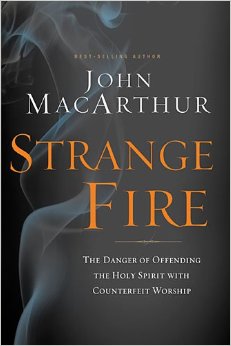John MacArthur’s Strange Fire, reviewed by Monte Lee Rice
 John MacArthur, Strange Fire: The Danger of Offending the Holy Spirit with Counterfeit Worship (Nashville, TN: Nelson Books, 2013), 333 pages, ISBN 9781400206414.
John MacArthur, Strange Fire: The Danger of Offending the Holy Spirit with Counterfeit Worship (Nashville, TN: Nelson Books, 2013), 333 pages, ISBN 9781400206414.
Introduction
In this highly polemical book, John MacArthur argues that as an aggressive though “counterfeit” form of Christian spirituality, the global Pentecostal-Charismatic movement is neither founded on nor representative of orthodox Christian doctrine. He claims it has infiltrated and is undermining orthodox Christianity with “counterfeit” theologies, worship beliefs, and practices—all emerging from its heretical doctrine of the Holy Spirit. MacArthur’s stated purpose for writing this book is to therefore galvanize the “evangelical church” in concerted condemnation against its existence, and honour the Holy Spirit by ridding the evangelical church of the movement’s influence, thus leading to the recovery of correct doctrines of the Holy Spirit.
Having read some highly constructive reviews and responses emerging on MacArthur’s book, in this review, I will hopefully avoid covering matters already well addressed, and provide critique on issues perhaps not adequately touched. I will begin first however with a thematic survey on the book’s content.
Survey
In sermonic style, MacArthur begins his treatise by setting forth the Pentateuchal narrative on Nadab and Abihu’s priestly offering of “strange fire” and God’s judgement against them, as his controlling metaphor for exposing the demonically sourced errors of Pentecostal/Charismatic spirituality that have infiltrated Evangelical Christianity. MacArthur then structures his book into three parts. In Part One (“Confronting a Counterfeit Revival”), MacArthur pursues two basic objectives. First (chapter 1) is to establish that the “systemic” reason for the Pentecostal-Charismatic movement’s existence as a false form of Christian spirituality, is its elevation of “religious experience over biblical truth.” (pp. 16-17). He then argues that at the heart of this aberration is the movement’s historical foundation upon a “deficient soteriology,” which conversely fosters this elevation of experience. Here, MacArthur directly blames the soteriological themes of 19th century Holiness Movement teachings (p. 27).
MacArthur moreover charges that this deficient soteriology under girded the preaching of early Pentecostal leaders, particularly that of Charles Parham. While stressing the dubious nature of Parham’s life and ministry, MacArthur argues that we acknowledge him as the originating founder of the Pentecostal/Charismatic movement—in order to jeopardize the theological “legitimacy” of the whole movement (p. 26-28). MacArthur moreover argues that equally responsible for the “theological foundations” of the movement is E.W. Kenyon, whose seminal Word of Faith doctrine MacArthur stresses, is rooted in a synthesis of various early 20th century “New Thought” metaphysical teachings (pp. 28-31). Hence, in MacArthur’s construal of Pentecostal historiography, Parham and Kenyon together “are responsible for the theological foundations upon which the entire charismatic system is built,” and together represent its dubious “historical roots.” Hence, in MacArthur’s construal of Pentecostal historiography, the doctrinal and moral errors of Parham and Kenyon together establish the dubious theological underpinnings of Pentecostalism and the Charismatic Movement (p. 31).
MacArthur’s second pursued objective of Part One (chapters 3 and 4) is to critique Pentecostal-Charismatic spirituality via Jonathan Edwards’ “distinguishing marks” of genuine spiritual renewal (e.g., “The Distinguishing Marks of a Work of the Spirit of God”). MacArthur thereby argues that Pentecostal-Charismatic spirituality is neither birthed by nor honouring to the Holy Spirit. To argue this MacArthur alleges that the movement shifts people away from Christ by its false doctrines, worship practices and experiences wrongly attributed to the Holy Spirit (pp. 53), and through its fostering of immorality via its emphasis on miracles and prosperity gospel teaching. (pp. 60, 65-66). Crucial also to this critique, is MacArthur’s allegations that Pentecostal/Charismatic spirituality moreover undermines Scriptural authority by encouraging believers to seek extra biblical revelation (pp. 67-68), thus elevating false experiences of God over Scriptural and doctrinal truth (pp. 71-72). Finally, MacArthur charges that Pentecostal-Charismatic spirituality fails to produce genuine love amongst believers (pp. 74-76), which MacArthur roots to the movement’s narcissistic blending of “mysticism” (via charismatic worship practices) to the “materialism of prosperity theology” (p. 78). MacArthur concluding verdict is that Pentecostals and Charismatics are “playing with strange fire” (p. 81).
Category: Spirit, Summer 2014


